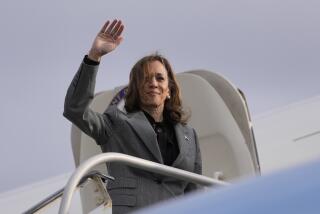CALIFORNIA ELECTIONS / PROPOSITION 188 : Tobacco Industry Gives Opponents Silent Treatment : Those seeking to eliminate local smoking bans have turned down most debates. They say they are running a ‘cerebral’ campaign; others say they’re hiding.
- Share via
SACRAMENTO — Tobacco industry backers of Proposition 188, which would repeal all local smoking bans in the state, have turned down almost all requests to debate the measure, even as they claim to be waging a “cerebral” campaign aimed at educating voters.
Proposition 188’s proponents declined invitations last week to a debate that would have aired on the ABC television affiliate in San Francisco, prompting those involved to cancel it.
Backers also did not send representatives to debates last week on a public radio station in San Francisco, and at UCLA and Temple Beth-Am on Los Angeles’ Westside--although in each of those instances organizers permitted opponents to debate “empty chairs.”
Proposition 188’s opponents, an underfunded coalition of health groups, doctors and anti-smoking activists, cite a dozen debates in the past month at which the initiative’s backers did not appear, and 10 are scheduled for the final weeks in which backers have said they will not take part.
“The tobacco industry is hiding from the public again because they know they have no public credibility,” said Paul Knepprath, spokesman for the No on 188 campaign.
Lee Stitzenberger, the Westwood political consultant who is strategist and chief spokesman for Proposition 188, cited three forums where he appeared for debates. One taped several weeks ago will be on this Sunday morning in Sacramento. The other two were aired in the summer when few voters were thinking about the Nov. 8 election.
“We’ve clearly had a few (debates) where for scheduling reasons we could not attend,” Stitzenberger said. “We have no strategy to not be there (for debates).”
The Yes on Proposition 188 campaign is funded almost exclusively by Philip Morris U.S.A., the nation’s largest cigarette maker, and four other large tobacco companies, including R.J. Reynolds.
By the end of September, the tobacco companies had poured nearly $8 million into the pro-Proposition 188 campaign, compared to $280,000 raised by opponents. Given their lack of funding, opponents are relying heavily on debates to get their message out that the initiative would harm public health.
Proposition 188 would repeal all smoking bans in California, replacing the prohibitions with a single, loose statewide standard. Under 188, owners of restaurants and other businesses could permit smoking in their establishments if they meet ventilation standards.
Those standards were created in 1989 in part with the aid of tobacco representatives, and were not designed to counter the ill-effects of secondhand smoke.
In a recent interview, Stitzenberger said he intends to run a “cerebral” campaign to inform voters that Proposition 188 would create a smoking standard that would be a reasonable compromise between smokers and nonsmokers. So far, he has waged the campaign primarily by sending mailers to California voters.
Opponents of 188 say their rivals are waging a “stealth” campaign, and the strategy appears to be paying off, or at least not hurting. A Los Angeles Times poll released Saturday shows Proposition 188 leading 49% to 43% among likely voters.
What would have been among the most visible events was the planned debate broadcast in San Francisco. Co-sponsored by KGO television, Contra Costa Times and League of Women Voters, organizers set out to find speakers in August for four major initiatives on the Nov. 8 ballot.
They found proponents and opponents for initiatives on immigration, health care and “three strikes”--all of which will be broadcast. Although opponents were ready to appear against Proposition 188, no proponents came forth, and the television station opted not to carry an empty-chair debate on the tobacco measure.
Sharon Burke of the League of Women Voters said she received excuses ranging from a man who said he never drove at night to one who said it was his wife’s birthday.
“I think there is more of a burden on the ‘yes’ side because they want to change the current law,” Burke said. She said proponents “have an obligation to not just campaign through paid media.”
Duane Garrett, host of a radio show on KGO in San Francisco, had a similar experience. Although Stitzenberger did not appear for an on-air debate, he did phone in last week for the final few minutes of Garrett’s show--after the opponent had left.
“They don’t want to get hammered in the free media,” said Garrett, a longtime Democratic Party strategist. “For every station like mine that will carry a single chair debate, there are 10 other stations that will back off because they’re concerned about fairness.”
More to Read
Get the L.A. Times Politics newsletter
Deeply reported insights into legislation, politics and policy from Sacramento, Washington and beyond. In your inbox twice per week.
You may occasionally receive promotional content from the Los Angeles Times.










